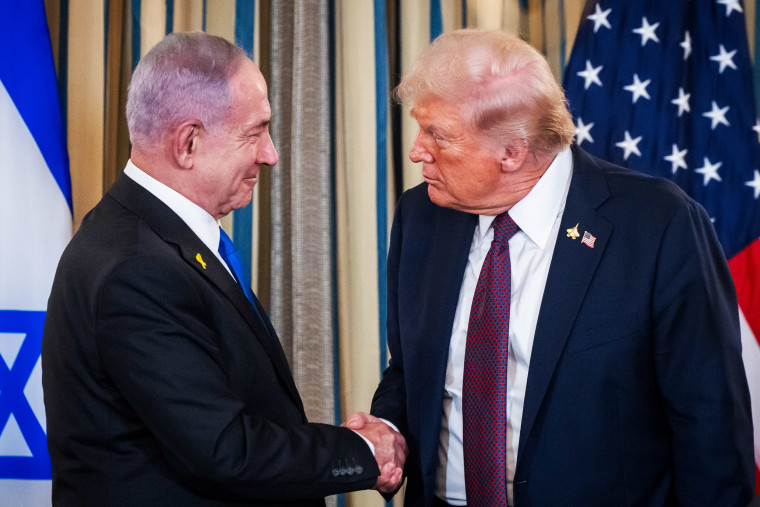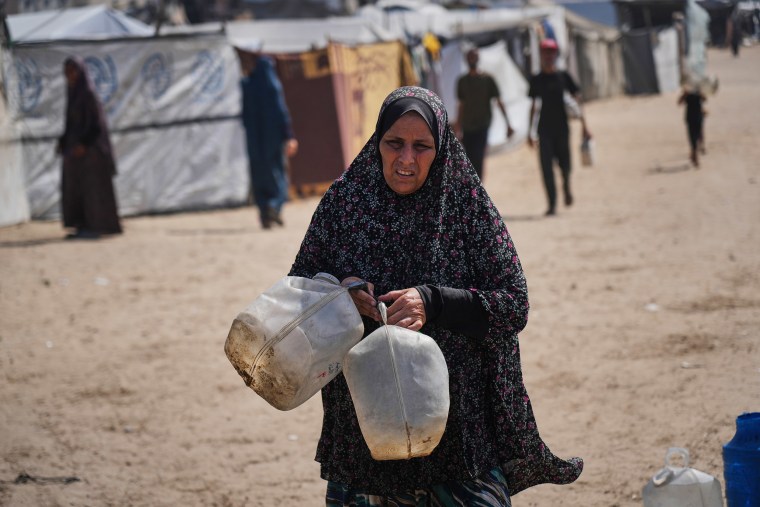President Donald Trump‘s peace plan was met with cautious optimism Tuesday by leaders across the Middle East and the world, but others were more skeptical about the proposal — and whether it would be welcomed by Hamas.
The plan was unveiled by Trump and Israeli Prime Minister Benjamin Netanyahu after talks that appeared to exclude Hamas, with the militant group saying “not a single Palestinian” had seen the plan before it was announced.
As the world awaited Hamas’ response, global powers lined up behind the U.S.-backed plan to end the Israeli assault and free hostages still held in the devastated Palestinian enclave.
 Israel has been unleashing intense airstrikes on Gaza City in the past few weeks in support of a new ground offensive.Saeed M. M. T. Jaras / Anadolu via Getty Images
Israel has been unleashing intense airstrikes on Gaza City in the past few weeks in support of a new ground offensive.Saeed M. M. T. Jaras / Anadolu via Getty Images
In a joint statement, Saudi Arabia, the United Arab Emirates, Qatar, Egypt, Jordan, Turkey, Indonesia and Pakistan welcomed the 20-point plan, calling Trump’s efforts “sincere.”
It also received support from Europe, where a number of countries had recently defied Washington to formally recognize Palestinian statehood. British Prime Minister Keir Starmer and French President Emmanuel Macron urged Hamas to agree to the plan, while Germany and the European Union itself offered public backing.
Trump branded the moment a “historic day for peace” — but he warned that if the militant group did not agree to the proposal, Israel would have U.S. backing to “finish the job of destroying the threat of Hamas.”
 Trump and Netanyahu outlined the plan at the White House on Monday. Jim Lo Scalzo / EPA/Bloomberg via Getty Images
Trump and Netanyahu outlined the plan at the White House on Monday. Jim Lo Scalzo / EPA/Bloomberg via Getty Images
Ismail Al-Thawabta, head of Gaza’s Hamas-run government media office, called the plan an “attempt to impose a new form of guardianship” on the besieged enclave. But Hamas said Tuesday that it would study the plan before providing its official response, The Associated Press news agency reported.
The plan would require Hamas members to lay down their arms, a demand the group has previously rejected.
The Palestinian Authority welcomed the plan, praising Trump for his “sincere and tireless efforts” to “end the war on Gaza” and reiterating its commitment to making reforms that could pave the way for a future Palestinian state.
Under the plan, Israel’s offensive in Gaza would end immediately once it’s agreed by both sides, with all hostages, alive and dead, to be released within a 72-hour period. The plan says no one will be forced to leave Gaza.
A pathway to Palestinian self-determination and statehood is outlined as a possibility — but not a guarantee.
And hours after announcing the plan alongside Trump, Netanyahu vowed again to oppose a Palestinian state. “Instead of Hamas isolating us, we turned the tables and isolated Hamas,” Netanyahu said in a Hebrew video discussing his U.S. trip.
Diana Buttu, a Palestinian lawyer and former adviser to Yasser Arafat’s Palestinian Liberation Organization, said Palestinians and leaders across the Middle East had little choice but to accept the plan.
She nonetheless criticized it as having “not a single guarantee” for the people of Gaza, who would be overseen by an international security force and a transitional authority chaired by Trump.
 Palestinians in Gaza are battling shortages of drinkable water as well as starvation under Israel’s assault.Abdel Kareem Hana / AP
Palestinians in Gaza are battling shortages of drinkable water as well as starvation under Israel’s assault.Abdel Kareem Hana / AP
“Because everybody wants to see an end to the genocide, you’re going to see that so many people are going to welcome this plan,” Buttu told NBC News in a phone interview.
But, she said, “there’s not a single guarantee that’s being given to Palestinians, not one.” Buttu added that she had little faith in the possibility that the plan if executed would lead to internationally recognized Palestinian statehood.
In Gaza, weary Palestinians have long been desperate to see an end to Israel’s deadly offensive in the enclave.
“Life is unbearable, there’s nothing — no food, no drinks no clothes,” Abdallah Qamar told The AP last week from famine-stricken Gaza City, where Israel has been carrying out a sweeping ground offensive.
In Israel, the plan to end the assault is likely to be welcomed by many within a populace increasingly critical of the war. The Hostages and Missing Families Forum, which represents the families of hostages, welcomed the plan.
The proposal is unlikely to win favor, however, among the far-right members of Netanyahu’s fragile government coalition upon whom his leadership relies.
In a lengthy post on X on Tuesday, Finance Minister Bezalel Smotrich said he believed Trump’s plan would only “end in tears,” calling early celebrations “absurd.”
On that, Buttu agreed, condemning the apparent lack of involvement of Palestinians in the bid to determine their future.
“They’re deciding and talking about Palestinians, but never to Palestinians — and that’s the part that is truly terrifying.”

